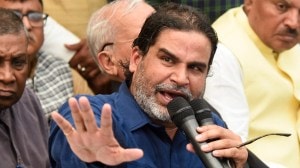Air India bans Shankar Mishra for four months for urinating on co-flier: What the rules say on unruly passengers
Shankar Mishra was arrested for urinating on a co-passenger while inebriated onboard a New York- Delhi flight last November
 Shankar Mishra (centre) has received a four-month flying ban from Air India. This will be in addition to any punishment the court hands out to him. (PTI Photo)
Shankar Mishra (centre) has received a four-month flying ban from Air India. This will be in addition to any punishment the court hands out to him. (PTI Photo) Air India has banned Shankar Mishra from flying for four months, news agency PTI reported citing an official. Mishra is currently under arrest for urinating on a fellow co-passenger while inebriated onboard an Air India flight between New York and Delhi.
After the incident came to light, Air India had earlier announced a 30-day ban on Mishra. We look at how exactly this decision was made and what are the rules and guidelines regarding unruly passengers.
Who is an unruly/disruptive passenger?
According to Air India’s official security regulations, a disruptive passenger is one “who fails to respect the rules of conduct at an airport or on board an aircraft or to follow the instructions of the airport staff or crew members and thereby disturbs the good order and discipline at an airport or on board the aircraft.”
Rule 23 of Aircraft Rules 1937 states that “No person shall, on board an aircraft (shall) assault, intimidate or threaten, whether physically or verbally, any person… consume alcoholic beverages or drugs … which is likely to endanger the safety of the aircraft or of any person or jeopardises the good order and discipline on board the aircraft.”
Shankar Mishra’s conduct falls under this definition: regardless of intention, his act of urinating on a co-passenger can be said to be “disrupting good order” on board the aircraft. Under an even broader definition, it can be equated to assault.
What is the crew supposed to do if a passenger is disruptive?
Each airline is supposed to maintain a SOP (Standard Operating Procedure) through which it will address any untoward behaviour, according to a 2017 notice regarding “handling of unruly/disruptive passengers”. Crew members, including pilots, receive training about how to deal with such situations.
Importantly, the crew must try and diffuse the situation to the best of their abilities while in air, while informing the passenger concerned about their indiscretions. A major flashpoint in the Shankar Mishra case was the crew’s reported inaction during the flight.
However, once the aircraft lands, a more thorough process gets underway.
How do airlines punish unruly passengers?
According to the previously mentioned notice, an airline is supposed to constitute an Internal Committee upon receiving any complaint. This committee consists of,
- Retired District & Sessions Judge as Chairman
- A representative from a different scheduled Airline as Member
- Representative from a passengers association or consumer association or retired officer of Consumer Dispute Redressal Forum as Member
This committee shall decide whether the reported offence falls under the following categories:
- Level 1: Disruptive behavior (physical gestures, verbal harassment, unruly inebriation, etc.)
- Level 2: Physically abusive behavior (pushing, kicking, hitting, grabbing or inappropriate touching or sexual harassment, etc.)
- Level 3: Life-threatening behavior (damage to aircraft operating system, physical violence such as choking, eye gouging, murderous assault, attempted or actual breach of the flight crew compartment, etc.)
Once the decision is made, the committee will decide appropriate punishment. Prior to the committee’s decision, an airline can ban a passenger for no more than 30 days.
What are the punishments and how are they decided?
The Internal Committee can ban persons from flying for various periods of time. Crucially, such punishments are “in addition to any action that may be taken against him under the appropriate law,” the 2017 notice said.
The prescribed punishments are as follows:
- Level 1 offence: up to 3 months
- Level 2 offence: up to 6 months
- Level 3 offence: for a minimum period of 2 years or more without limit
- Persons deemed to be a “threat to national security” can be slapped with indefinite bans which can be ended once they are not deemed to be a threat any more.
Subsequent offences invite a ban double the length of the previous penalty.
The four-month penalty meted out to Shankar Mishra seems to indicate that the Internal Committee considered his behaviour to constitute a Level 2 offence. However, the committee has not given him the maximum sentence possible under this category.



- 01
- 02
- 03
- 04
- 05



































